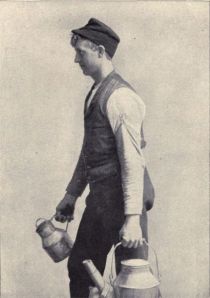46 The Milkman. By Krausz, Sigmund
It is early in the morning. The dawn of the coming day is battling with the shadows of the night. The streets of the city are empty and the pulse of urban life is low. This is the time for the milkman. His wagon comes rattling down the street or alley. Perhaps it wakes you from a pleasant slumber and you turn with a vigorous expression towards the wall trying to pick up the ruptured thread of your dream. Don’t curse the milkman. He tries to make his living. And he has no easy road to travel either. Summer and winter he rises at the wee small hours of the morning. Rain or snow, heat or cold cannot keep him from getting his supply of milk from the earliest morning trains. From there he makes the route of his customers. His horse is a valuable helpmate to him. It saves time. It knows the streets and alleys as well as its master, and it stops automatically at the customers’ houses. It does not need any urging, and starts toward the house of the next customer as soon as it sees its master run down the steps with the rattling cans.
Mean people have slandered the milkman basely by asserting that he gets his lacteous ware from the hydrant. That is not so. If the milk has a bluish tint and looks a little thin it is generally the wily farmer’s fault. And who could really blame him if he watered his stock a little? There are others who do the same. Still they are respected. Why should not we respect the milkman?
Mean people have slandered the milkman basely by asserting that he gets his lacteous ware from the hydrant. That is not so. If the milk has a bluish tint and looks a little thin it is generally the wily farmer’s fault. And who could really blame him if he watered his stock a little? There are others who do the same. Still they are respected. Why should not we respect the milkman?
Dieses Kapitel ist Teil des Buches STREET TYPES GREAT AMERICAN CITIES
